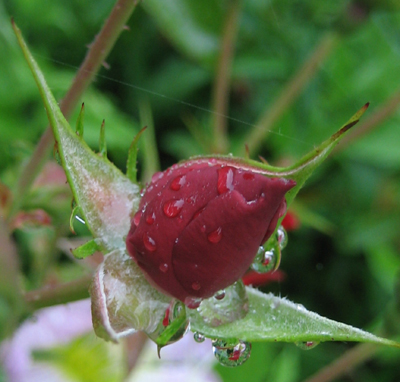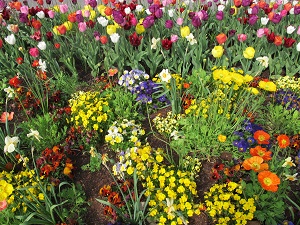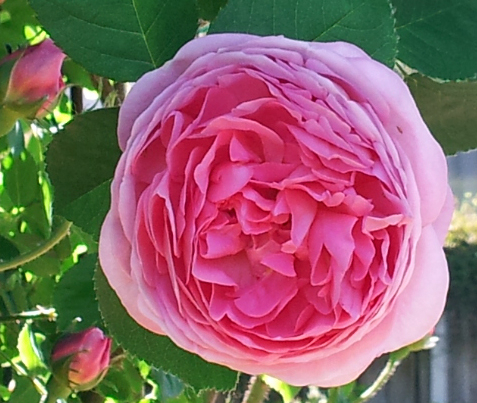Guest Feature by John Wynn-Jones: Flowers
Dr John Wynn-Jones is well known in WONCA circles and immediate past chair of the WONCA Working Party on Rural Practice. During the COVID-19 crisis he has been writing a daily 'Rural Miscellany' email with poems and resource ideas to help and divert us in this difficult time. This month we feature his item on "flowers".
 “The earth laughs in flowers.”
“The earth laughs in flowers.”
Ralph Waldo Emerson
“I must have flowers, always, and always.”
Claude Monet
“I know a bank where the wild thyme blows,
Where oxlips and the nodding violet grows,
Quite over-canopied with luscious woodbine,
With sweet musk-roses and with eglantine.”
William Shakespeare (A Midsummer Night’s Dream)
“A flower blossoms for its own joy.”
Oscar Wilde
“Who wants flowers when you're dead? Nobody.”
J.D. Salinger (The Catcher in the Rye)
These Poems are based on the theme of flowers. Flowers feature in all aspects of our lives. They are used as tokens of love, faithfulness, friendship and grief. Their blossoms are transient, and poets often conjure images of flowers to remind us of our mortality and our frailty. We labour to grow flowers in and around our houses and gardens because they make us feel comfortable, peaceful and happy. Whatever the signify, they are items of great beauty and they are to be celebrated and adored.
We have eight poems from around the world starting in the 8th Century and finishing in the 21st Century. Please enjoy!
Bai Juyi (772-846)
Bai Juyi was a renowned Chinese poet and Tang dynasty government official. Many of his poems concern his career or observations made about everyday life, including as governor of three different provinces. Bai was also influential in the historical development of Japanese literature
Regret for Red Peonies
A melancholy walk among red peonies;
When evening comes, only two flowers remain.
They will not survive the morning wind;
I regret their passing by the campfire's light.
Translated by Baudelaire Jones
William Wordsworth (1770-1850)
William Wordsworth was an English Romantic poet who, with Samuel Taylor Coleridge, helped to launch the Romantic Age in English literature with their joint publication Lyrical Ballads.
Some of you will remember that I have already included this poem before but it is impossible to put together a collection of poems on flowers without including this wonderful joyous poem form such a great romantic poet.
The poem records a moment when Wordsworth was walking with his sister Dorothy when they came across an expanse of wild daffodils. She recorded the event in her diary; “I never saw daffodils so beautiful they grew among the mossy stones about & about them, some rested their heads upon these stones as on a pillow for weariness & the rest tossed and reeled and danced & seemed as if they verily laughed with the wind that blew upon them over the Lake, they looked so gay ever dancing ever changing.”
I wandered lonely as a Cloud
I wandered lonely as a Cloud
That floats on high o'er Vales and Hills,
When all at once I saw a crowd,
A host of golden Daffodils;
Beside the Lake, beneath the trees,
Fluttering and dancing in the breeze.
Continuous as the stars that shine
And twinkle on the Milky Way,
They stretched in never-ending line
Along the margin of a bay:
Ten thousand saw I at a glance,
Tossing their heads in sprightly dance.
The waves beside them danced, but they
Out-did the sparkling waves in glee:—
A Poet could not but be gay
In such a jocund company:
I gazed—and gazed—but little thought
What wealth the shew to me had brought:
For oft when on my couch I lie
In vacant or in pensive mood,
They flash upon that inward eye
Which is the bliss of solitude,
And then my heart with pleasure fills,
And dances with the Daffodils.
> Listen to the poem recited by Victor Vertunni
William Blake (1775-1827)
William Blake was an English poet, painter, and printmaker. Largely unrecognised during his lifetime, Blake is now considered a inspirational figure in the history of the poetry and visual arts of the Romantic Age.
The sunflower acts as an allegory for a human being: in particular, a traveller. They are tired of life and wish for something more. This takes the form of an afterlife that may also be associated with a world of imagination where people can visualise their highest aspirations. Blake presents this (afterlife/imagination) as an end-goal that everyone should attempt to reach, as he believes that it will enable them to escape from the brutal realities of human existence.
Ah! Sunflower
Ah Sunflower, weary of time,
Who countest the steps of the sun;
Seeking after that sweet golden clime
Where the traveller's journey is done;
Where the Youth pined away with desire,
And the pale virgin shrouded in snow,
Arise from their graves, and aspire
Where my Sunflower wishes to go!
Ah Sunflower, William Blake, read by Allen Ginsberg
Percy Shelley (1792-1822)
Percy Bysshe Shelley was one of the major English Romantic poets, widely regarded as one of the greatest lyric and philosophical poets in the English language.
The Flower That Smiles Today is a poem about the brevity of all things – all hopes, desires, and delights the world has to offer are short-lived and doomed to die. Everything is fleeting and transitory.
The flower that smiles to-day

The flower that smiles to-day
To-morrow dies;
All that we wish to stay
Tempts and then flies.
What is this world’s delight?
Lightning that mocks the night,
Brief even as bright.
Virtue, how frail it is!
Friendship how rare!
Love, how it sells poor bliss
For proud despair!

But we, though soon they fall,
Survive their joy, and all
Which ours we call.
Whilst skies are blue and bright,
Whilst flowers are gay,
Whilst eyes that change ere night
Make glad the day;
Whilst yet the calm hours creep,
Dream thou—and from thy sleep
Then wake to weep.
A. E. Housman (1859-1936)
Alfred Edward Housman, usually known as A. E. Housman, was an English classical scholar and poet. He is best known for his cycle of poems A Shropshire Lad which evoke the dooms and disappointments of youth in the English countryside.
This poem is not so well known. The Lent Lily’ is, the daffodil. Daffodils don’t last long, and we have a narrow window every spring to enjoy their beauty in all its bright and yellowness. Like Wordsworth's poem above it is celebration of their joyous quality, is as much a reminder that part of the joy of daffodils lies in their being recollected long after they have been seen and admired.
The Lent Lily
’Tis spring; come out to ramble
The hilly brakes around,
For under thorn and bramble
About the hollow ground
The primroses are found.
And there’s the windflower chilly
With all the winds at play,
And there’s the Lenten lily
That has not long to stay
And dies on Easter day.
And since till girls go maying
You find the primrose still,
And find the windflower playing
With every wind at will,
But not the daffodil,
Bring baskets now, and sally
Upon the spring’s array,
And bear from hill and valley
The daffodil away
That dies on Easter day.
A E Houseman - The Lent Lilly
https://www.youtube.com/watch?v=3NfgNqAhLe8
Rabindranath Tagore (1861-1941)
Rabindranath Tagore was a Bengali poet, writer, music composer, and painter from the Indian subcontinent whose poetry we have already met a week ago. The poem talks once again about the short-lived life of the flower and the transience of our lives. We all have something to offer however insignificant we might appear. We can offer ourselves up to something greater.
Flower
Pluck this little flower and take it, delay not! I fear lest it
droop and drop into the dust.
I may not find a place in thy garland, but honour it with a touch of
pain from thy hand and pluck it. I fear lest the day end before I am
aware, and the time of offering go by.
Though its colour be not deep and its smell be faint, use this flower
in thy service and pluck it while there is time.
>Listen to the poem
Peter Seeger (1919-2014)
Peter Seeger was an American folk singer and social activist. He had a string of hit records during the early 1950s as a member of the Weavers.
Where Have All the Flowers Gone?" is a modern protest folk song written by Pete Seeger. In fact he wrote the melody and the first 3 verses. Additional verses were added in May 1960 by Joe Hickerson . The New Statesman listed it as one of the "Top 20 Political Songs".
It has been recorded many times but probably the most well known is by Peter, Paul and Mary in 1962
Where have all the flowers gone

Where have all the flowers gone, long time passing?
Where have all the flowers gone, long time ago?
Where have all the flowers gone?
Young girls have picked them everyone.
Oh, when will they ever learn?
Oh, when will they ever learn?
Where have all the young girls gone, long time passing?
Where have all the young girls gone, long time ago?
Where have all the young girls gone?
Gone for husbands everyone.
Oh, when will they ever learn?
Oh, when will they ever learn?
Where have all the husbands gone, long time passing?
Where have all the husbands gone, long time ago?
Where have all the husbands gone?
Gone for soldiers everyone
Oh, when will they ever learn?
Oh, when will they ever learn?
Where have all the soldiers gone, long time passing?
Where have all the soldiers gone, long time ago?
Where have all the soldiers gone?
Gone to graveyards, everyone.
Oh, when will they ever learn?
Oh, when will they ever learn?
Where have all the graveyards gone, long time passing?
Where have all the graveyards gone, long time ago?
Where have all the graveyards gone?
Gone to flowers, everyone.
Oh, when will they ever learn?
Oh, when will they ever learn?
Where have all the flowers gone, long time passing?
Where have all the flowers gone, long time ago?
Where have all the flowers gone?
Young girls have picked them everyone.
Oh, when will they ever learn?
Oh, when will they ever learn?
Listen to Peter Paul and Mary
Ishan Malik
I must apologise but I can find very little about Ishan Malik on the internet. I believe he is young and writes in Urdu. Please let me know, if you can find more about him.
I loved this poem which was written in 2006. Simple but also profound. Please enjoy.
Rose in Full Bloom

Rambling down a cobbled pathway,
I stumbled upon a wild rose,
Deep garnet red,
Velveteen petals each curled to perfection,
Luminescent and innocently pretty,
A coy damsel oblivious of her beauty,
Fading away unadored and unsung,
Looking at me, she blushed
I stood love stung, adoring her,
Borrowed a steam bearing a bud
Planted her proudly in my garden,
Ever day, day after day,
I watched my rose break out of its chrysalis,
Groomed it with devout care,
Nurturing it with fertilizer,
Admiring it with every moment,
Watching it grown and come into full bloom,
Tall and elegant till it grew
And looked down on me!